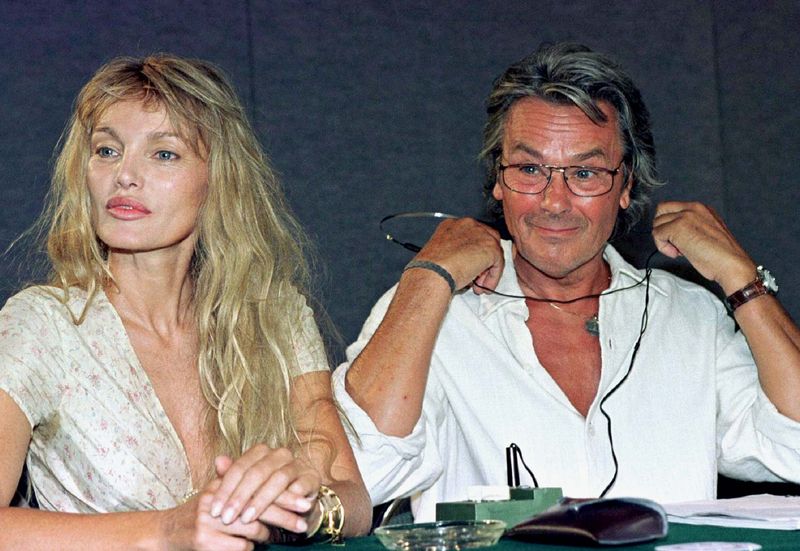PARIS (Reuters) – French actor Alain Delon, who melted the hearts of millions of movie fans playing an assassin, a hoodlum or a hitman in his postwar heyday, has died, his three children said on Sunday. He was 88.
Delon had been in poor health since suffering a stroke in 2019 and rarely left his estate in Douchy, in France’s Loire Valley region.
President Emmanuel Macron called him a giant of French culture.
“Alain Delon played legendary roles and made the world dream. Lending his unforgettable face to shake up our lives. Melancholic, popular, reserved, he was more than a star: he was a French monument,” he wrote on X.
With his striking blue eyes, Delon was sometimes called the “French Frank Sinatra” for his good looks, a comparison Delon did not like. Unlike Sinatra, who always denied his connections to the Mafia, Delon openly acknowledged his shady friends in the underworld.
In a 1970 interview with The New York Times, Delon was asked about these acquaintances, one of whom was among the last “godfathers” of the underworld in the Mediterranean port of Marseille.
“Most of the gangsters I know… were my friends before I became an actor,” he said. “I don’t care what a friend does. Everyone is responsible for their own act. It doesn’t matter what they do.”
DELON HAS ACTED IN FILMS BY VISCONTI, MELVILLE, LOSEY
Delon achieved fame in two films by Italian director Luchino Visconti, “Rocco and His Brothers” in 1960 and “The Leopard” in 1963.
He starred opposite Jean Gabin in Henri Verneuil’s 1963 film “Melodie en Sous-Sol” (“Any Number Can Win”) and was a huge hit in Jean-Pierre Melville’s 1967 film “Le Samourai” (“The Godson”). The role of a philosophical hitman for hire involved minimal dialogue and frequent solo scenes, and Delon shone.
Delon became a star in France and was idolized by men and women in Japan, but he never made it big in Hollywood, despite acting with American film giants, including Burt Lancaster, when the Frenchman played the apprentice hitman Scorpio in the 1973 film of the same name.
In the 1970 film “Borsalino,” he starred alongside fellow French actor Jean-Paul Belmondo, playing two gangsters who face off in an unforgettable, stylized fight over a woman.
Highlights include the 1969 erotic thriller “La Piscine” (“The Swimming Pool (NASDAQ:)”), in which Delon teams up with his real-life lover Romy Schneider in a sensual French Riviera saga of jealousy and seduction.
Delon’s standout film of the 1970s, a decade when he and Belmondo were mainstays of the French box office, was Joseph Losey’s 1976 film “Monsieur Klein,” in which he plays an art dealer in occupied Paris during World War II who is mistaken for a Jewish fugitive of the same name.
MAN AT ALL
Born just outside Paris on November 8, 1935, Delon was placed in foster care at the age of four following his parents’ divorce.
He ran away from home at least once and was expelled from boarding schools several times before joining the Marines at 17 and serving in then-French-ruled Indochina. There, too, he got into trouble over a stolen jeep.
Returning to France in the mid-1950s, he worked as a porter at Paris’ wholesale food market, Les Halles, and spent time in the red-light district of Pigalle before moving to the cafés of the bohemian St. Germain des Pres.
There he met French actor Jean-Claude Brialy, who took him to the Cannes Film Festival, where he caught the attention of an American talent scout who arranged an audition.
She made her film debut in 1957 in “Quand la femme s’en mele” (“Send a Woman When the Devil Fails”).
SULPHUR FRIENDS
Delon was a businessman as well as an actor, exploiting his looks to sell branded cosmetics and dabbling in racehorses with old gangland friends. He invested in a racehorse stable with Jacky “Le Mat” Imbert, a well-known figure in a thriving Marseille crime scene.
Delon’s shadier friendships came to light when his former bodyguard and confidant, a young Yugoslavian named Stefan Markovic, was found dead in a sack, with a bullet in his head, abandoned in a landfill near Paris.
The actor was questioned and cleared by the police, but the “Markovic case” turned into a national scandal.
The man accused by the police of Markovic’s murder (later acquitted) was Francois Marcantoni, a Corsican bar owner and friend of Delon, who thrived in the lively Pigalle district in the aftermath of World War II.
FRANK
Delon has also been outspoken off stage and has sparked controversy, particularly when he said he regrets the abolition of the death penalty and spoke disparagingly of gay marriage, which was legalized in France in 2013.
He publicly defended the far-right National Front party and telephoned its founder Jean-Marie Le Pen, an old friend, to congratulate him when the party did well in local elections in 2014.
Delon’s lovers included Schneider and German model-turned-singer Nico, with whom he had a son. In 1964, he married Nathalie Barthelemy and fathered a second child before ending the marriage and embarking on a 15-year relationship with Mireille Darc. He had two more children with Dutch model Rosalie van Breemen.
In an interview with Paris Match in 2018, Delon said he was fed up with modern life and had arranged a chapel and a tomb for himself on the grounds of his home near Geneva, as well as for his Belgian Shepherd dog, named Loubo.
Delon’s last major public appearance was the ceremony where he received the honorary Palme d’Or at the Cannes Film Festival in May 2019.

In recent years, Delon has been at the center of a family feud over his medical care, which has made headlines in the French media.
In April 2024, a judge placed Delon under “enhanced conservatorship,” meaning he no longer had full freedom to manage his assets. He was already under legal protection due to concerns about his health and well-being.





